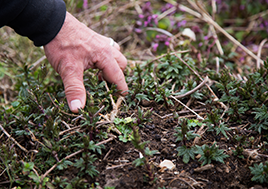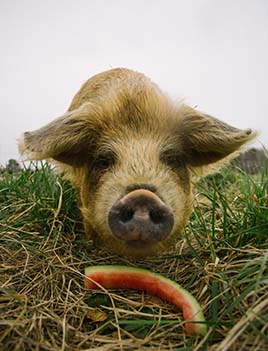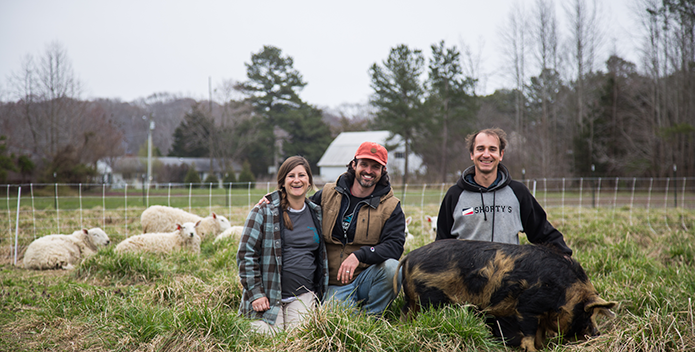Since 2014, Brett and Megan Hines have operated Naturally Sunkissed Farm in Bishopville, Maryland, a small-scale, diversified, and locally-distributing farm. That is when Megan's parents, who own the farm, turned the land formerly used to grow corn and soybeans into pasture.
This couple has made it a priority in life to craft a wilder world by mimicking the natural processes of the earth in their farming techniques. Brett and Megan agree that they truly have to have a passion for the work, especially if they are teaching at the same time (both teach full-time at nearby schools in Sussex County, Delaware, where their experience as farmers frequently helps them in the classroom). It would be very easy to get burnt out if they didn't love what they are doing, but their passion is evident in their farm's persona and appearance.
Naturally Sunkissed Farm raises KuneKune Pigs, North Country Cheviot Sheep, Nigerian Dwarf Goats, and a mixed flock of chickens. It includes a small fruit orchard, and an annual vegetable field consisting of beets, radishes, spinach, lettuce, arugula, kale, and much more. In addition, the Hines grow organic perennial crops like strawberries, asparagus, and hops.
"We eat year-round, so we should grow our food year-round," says Brett.

Growing around a support system, hops first grow vertically and then clockwise.
Zachary Garmoe.
The hops-growing process is nothing short of fascinating. Growing around a support system, hops first grow vertically and then clockwise. Brett has his hops spreading up long wires that lead to a wooden pole. Not only does the structure look intriguing, but the smell of the hops permeates the air where they are grown.
The Hines strive to run an environmentally friendly and sustainable farm. Their sheep and pigs are grass-fed and graze rotationally, moving to a different pasture every four to five days. They grow vegetables using organic practices in raised beds that prevent damage from flooding or bad weather. They use only hand tools for the soil, and a broad fork replaces a tiller, a tool that can create more negative impacts on the soil and growing process. The food that the Hines produce is natural and nutrient-dense.
"As soon as you cut a plant from the roots, it starts losing nutrients," Megan says.
So, they harvest and consume the food themselves or sell it locally so that it remains fresh and full of nutrients. One bite of the arugula picked directly from their vegetable bed brings a mouthful of flavor, with a wonderful spicy yet refreshing aftertaste of the vegetable.
"That is how arugula is supposed to taste; it lacks the synthetic fertilizers and pesticides being imposed on many of the foods we eat today," Brett explains. Naturally Sunkissed Farm is bringing flavor back to the food we eat.
The farm is located just outside of the Chesapeake Bay Watershed. However, the Hines belong to a community of farmers that own land within the Bay's watershed and whose decisions impact the overall health of the Bay. The young farmers also network with Chesapeake farmers at events like the Future Harvest CASA Conference, to connect with this community and gain more knowledge and guidance for their own farming. Being young, beginning farmers is no easy task. Fortunately for people like the Hines, the farming community is generous in supporting each other by sharing expertise and advice.

At Naturally Sunkissed Farm, the animals are friendly and happy.
Zachary Garmoe.
Perpetuating environmentally friendly farming practices has taken on new importance for the Hines. They are about to start a family, and believe it's essential their children grow up respecting the environment, farming sustainably, eating healthily, and preserving the earth for the generations to come. The couple's actions spoke louder than their words when they explained that they raised all the food for their own wedding, except for the bread and cake. They even home-brewed their own beer and wine.
Brett and Megan say, "Our world is way less wild [than it used to be]."
To bring a little more "wild" into people's lives, they host goat yoga classes, and invite school kids and their families to come out to the farm to learn about the work, animals, and plants. Many of the children have never been to a farm or have never had the chance to interact with friendly farm animals up close.
At Naturally Sunkissed Farm, the animals are friendly and happy, the vegetables are bursting with flavor, and Brett and Megan's smiles could not be more genuine. May Brett and Megan continue to make the world wilder and more flavorful. In addition, may they spread their environmental practices and ideas to farmers all over the Chesapeake Bay Watershed.




